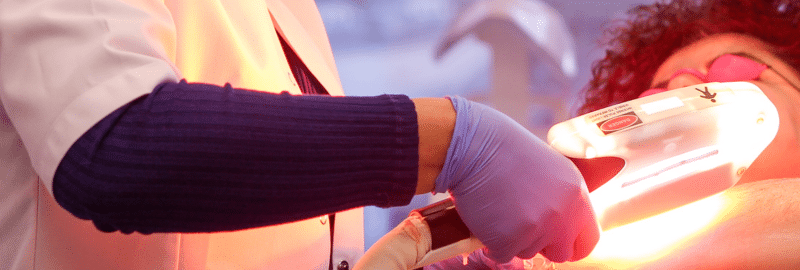Laser skin treatments have revolutionized dermatology, offering a wide array of medical and cosmetic applications that improve skin’s health and appearance. From helping to clear blemishes and improving texture to boosting your natural collagen production, laser treatments are a non-invasive way to achieve your skin goals with little downtime or side effects. But can these innovative laser treatments increase your risk of developing melanoma? As we observe Melanoma and Skin Cancer Awareness Month, Dr. Nita Patel debunks misconceptions about the safety of laser skin treatments.
Do Laser Treatments Cause Skin Cancer?
The short answer: No, laser skin treatments do not significantly increase your risk for skin cancer.
It’s easy to understand why you might be concerned about the connection between lasers and skin cancer. We know sun damage is a leading cause of all forms of skin cancer, including melanoma. Since lasers use highly targeted light energy to treat the skin, concerns about the lasting effects are only natural. However, most clinical research shows no significant increase in skin cancer related to getting laser skin treatments.
There are a few reasons why. First, the sun damage that leads to skin cancer happens over time, requiring much more exposure than occurs during a laser treatment session. Having 5 or more sunburns in your lifetime doubles your risk of skin cancer, but this damage is significantly higher than anything that would occur during laser skin treatments.
Second, the type of light used in medical lasers is very different from the sun’s ultraviolet (UV) rays that cause DNA damage, leading to skin cancer. Lasers used in dermatology are carefully calibrated to deliver specific wavelengths of light that target pigmentation, redness, hair follicles, or collagen without penetrating deep into the DNA-sensitive layers of the skin. Unlike UV rays, which are unregulated in natural sunlight and harmful over time, medical lasers are controlled, targeted, and applied in short, therapeutic doses.
Additionally, laser treatments are performed by trained medical professionals who follow strict safety protocols. During treatment, your skin is often cooled and protected with specialized equipment to reduce the risk of burns or unwanted side effects. Reputable clinics like the office of Dr. Nita Patel also screen patients for contraindications, such as suspicious moles or skin conditions that could require further dermatologic evaluation before treatment. Your dermatologist may identify potentially cancerous lesions during your consultation and refer you for a biopsy or additional care.
If you have a personal or family history of skin cancer, it’s always wise to consult a board-certified dermatologist before beginning any cosmetic treatment plan. Your doctor can recommend the safest and most effective laser options based on your skin type, medical history, and aesthetic goals. With individualized guidance, you can take advantage of the benefits of laser technology while maintaining vigilance about your long-term skin health.
In honor of Melanoma and Skin Cancer Awareness Month, Dr. Nita Patel reminds patients of the importance of regular skin checks, especially if you’re undergoing treatments that draw your attention to your skin’s appearance. Catching suspicious lesions early is key to successful treatment outcomes.
Have questions about whether laser treatments are right for you? Schedule a consultation with Dr. Nita Patel to learn more and develop a customized treatment plan that aligns with your goals and your skin’s needs.



